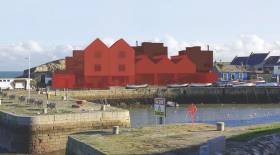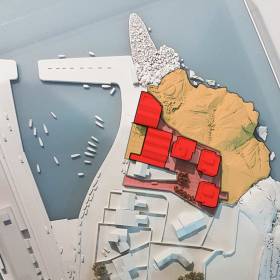Displaying items by tag: Bartra Property
#DublinBay - New plans to redevelop Bulloch Harbour, Dalkey in south Dublin writes The Irish Times has been dismissed by local opponents as “in some respects worse” than an original design rejected by planners a year ago.
A public meeting took place on Tuesday night aimed at rallying opposition to the development (see previous report) which Bartra Capital Property Group is behind.
The company, founded by developer Richard Barrett, has revised its earlier plan and hopes to secure permission from Dún Laoghaire-Rathdown County Council for a scheme that would include two apartments and three large houses. It would also provide a building workshop for “traditional timber boats”, a public square, a cafe, community changing facilities and new units for existing businesses, including boat rentals.
Despite the developer’s insistence it addressed issues arising from its previous application, opponents say they remain concerned about potential flooding, wave over-topping and a scale of build considered “a gross intrusion” to the existing area.
“Unfortunately, this new application is in some respects worse than the one refused by the council,” said the Bulloch Harbour Preservation Association (BHPA) which organised the meeting, attended by about 250 people.
Its members believe the new application “pays virtually no attention to the special character, heritage and history of this small working harbour”.
To read further on the history and heritage of the small south Dublin Bay harbour, click here.
Councillor Urges DLRCC to Turn Down Plans in Bulloch Harbour, Dalkey
#DublinBay - A Councillor has urged Dun Laoghaire Rathdown County Council to reject the latest plans for Bulloch Harbour, Dalkey, writes the Dublin Gazette.
Councillor Michael Merrigan (Ind) has called on council planners to reject the current planning application for a mixed use development on the historic south Dublin Bay harbour pier.
Councillor Merrigan said he had considered in detail the planning application, drawings and reports lodged by the applicant with Dun Laoghaire Rathdown County Council, which Afloat adds took place just days before Christmas.
Afloat also adds that the mixed development lodged to DLCC by Bartra Property is for marine commercial, leisure/community and residential buildings.
A public meeting organised by Save Bulloch Harbour, led by Bulloch Harbour Preservation Association, is to be held next Tuesday, 23 January, for further details see photo-caption above.
As the Dublin Gazette continues, original plans were rejected in February last year after almost 300 residents lodged complaints about the proposal.
Cllr Merrigan said: “The current development proposal submitted to the planning authority is inappropriate for Bulloch Harbour.
“It fails to address, the unique sense of place and maritime heritage and character of the area, which needs to be protected and sensitively enhanced as a coastal amenity.
“As a local county councillor for the area I am disappointed that no progress has been made on a master plan for the harbour.”
Cllr Merrigan said he had a number of concerns over the new plan.
He said that it was an inappropriate development for the area and added that it would have a negative impact on the existing fishing boat hire services.
To read more on the development, click here.
Objections of Nearly 300 to Bulloch Harbour Development Plan
#BullochHarbour - Submissions totalling 283 writes The Irish Times have been filed on a controversial development proposed for one of south Dublin’s most popular coastal inlets.
The Bulloch Harbour planning application would see a mixed-use development of commercial and residential buildings on the seafront.
Hostile public reaction immediately followed its filing in December, with meetings and an opposition campaign as covered on Afloat were quickly organised.
The Dún Laoghaire-Rathdown County Council planning department was still processing objections and observations over the weekend following last Thursday’s deadline.
A decision is expected in March. For more on the story click here.































































